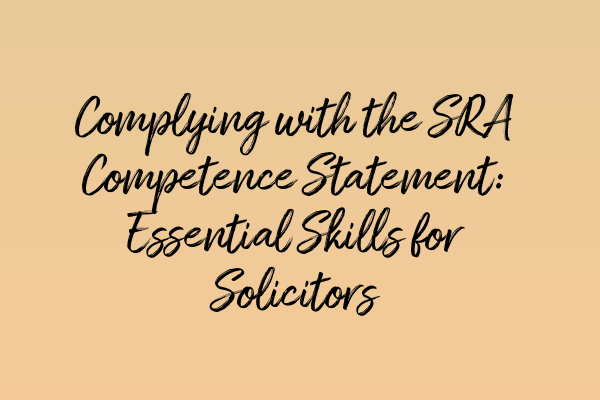Complying with the SRA Competence Statement: Essential Skills for Solicitors
As a solicitor, it is essential to stay aware of the requirements set forth by the Solicitors Regulation Authority (SRA). The SRA Competence Statement outlines the necessary skills and attributes that solicitors must possess to meet the standards expected of the legal profession. Complying with this statement is crucial for both professional development and the effective practice of law.
In this blog post, we will explore the key components of the SRA Competence Statement and discuss how solicitors can ensure they meet these requirements.
1. Technical Legal Practice Skills
The first aspect of the SRA Competence Statement focuses on the technical legal practice skills that solicitors must possess. This includes knowledge of substantive and procedural law, legal research, legal writing, drafting legal documents, and advocacy. It is crucial for solicitors to stay up-to-date with changes in the law and continue to develop their knowledge and skills in these areas.
To enhance your technical legal practice skills, it is recommended to regularly engage in professional development activities such as attending legal seminars, workshops, and conferences. Additionally, subscribing to legal publications and participating in online legal forums can help you stay informed about updates and developments in your area of practice.
2. Ethical and Professional Judgment
The SRA Competence Statement also emphasizes the importance of ethical and professional judgment. Solicitors are expected to uphold the highest standards of integrity and ethical conduct in their professional practice. This includes maintaining client confidentiality, avoiding conflicts of interest, and acting in the best interests of clients.
To ensure compliance with ethical and professional standards, solicitors should familiarize themselves with the Solicitors’ Code of Conduct and any relevant professional guidance provided by the SRA. Additionally, regularly reviewing and reflecting on ethical scenarios and case studies can help develop sound judgment and decision-making skills.
3. Legal Research and Analysis
Competency in legal research and analysis is another critical aspect of the SRA Competence Statement. Solicitors must be able to identify and retrieve relevant legal information, analyze complex legal issues, and apply legal principles to specific cases and situations.
Keeping up with modern research techniques and technology can greatly enhance your legal research skills. Utilize online legal databases, search engines, and academic resources to stay updated with the latest legal research methodologies and tools. Regularly reviewing legal precedents and case law can also help strengthen your research and analytical abilities.
4. Drafting and Communication Skills
Effective communication is a fundamental skill for solicitors. Clear and concise written and oral communication is necessary to convey complex legal concepts and advice to clients, colleagues, and the court.
To improve your drafting and communication skills, consider seeking feedback from peers and senior solicitors on your written work. Participating in legal writing workshops or engaging in activities such as moot court competitions can also help enhance your oral advocacy skills.
5. Managing Yourself and Your Work
Solicitors are expected to effectively manage themselves and their workloads to ensure the timely and quality delivery of legal services. This includes time management, organizational skills, and the ability to prioritize tasks.
Utilize technology and practice management software to streamline your work processes and improve efficiency. Set realistic goals, create to-do lists, and develop strategies for managing stress and maintaining a healthy work-life balance.
In conclusion, complying with the SRA Competence Statement is essential for solicitors to demonstrate their professional competence and maintain high ethical standards. Developing and enhancing the necessary technical legal skills, ethical judgment, research and analysis abilities, communication skills, and self-management capabilities are crucial to meeting these requirements.
For more insights into practicing law and related topics, be sure to check out the following articles:
– Private Prosecutions: Exploring Non-Governmental Prosecutions in Criminal Cases
– Demystifying Criminal Law Procedures: A Step-by-Step Guide
– Rights of the Accused: Protecting Individual Liberties in Criminal Proceedings
– Magistrates’ Court vs Crown Court: Understanding Key Differences
– Protecting Vulnerable Witnesses in Criminal Trials: Best Practices and Legal Safeguards
Stay committed to professional development, uphold ethical standards, and continuously strive for excellence in your legal practice. By doing so, you will ensure compliance with the SRA Competence Statement and establish yourself as a reputable and competent solicitor.


Leave a Reply